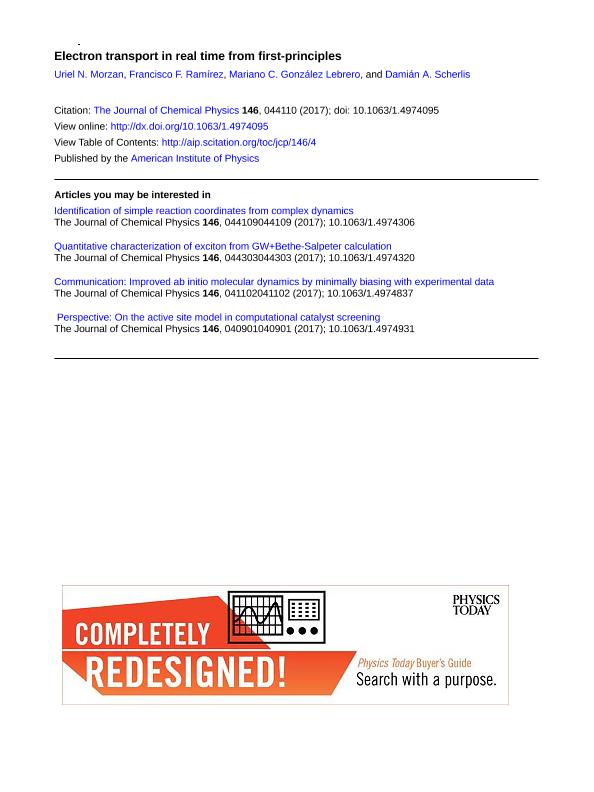Artículo
Electron transport in real time from first-principles
Morzan, Uriel ; Ramírez, Francisco Fernando
; Ramírez, Francisco Fernando ; González Lebrero, Mariano Camilo
; González Lebrero, Mariano Camilo ; Scherlis Perel, Damian Ariel
; Scherlis Perel, Damian Ariel
 ; Ramírez, Francisco Fernando
; Ramírez, Francisco Fernando ; González Lebrero, Mariano Camilo
; González Lebrero, Mariano Camilo ; Scherlis Perel, Damian Ariel
; Scherlis Perel, Damian Ariel
Fecha de publicación:
01/2017
Editorial:
American Institute of Physics
Revista:
Journal of Chemical Physics
ISSN:
0021-9606
Idioma:
Inglés
Tipo de recurso:
Artículo publicado
Clasificación temática:
Resumen
While the vast majority of calculations reported on molecular conductance have been based on the static non-equilibrium Green’s function formalism combined with density functional theory (DFT), in recent years a few time-dependent approaches to transport have started to emerge. Among these, the driven Liouville-von Neumann equation [C. G. Sánchez et al., J. Chem. Phys. 124, 214708 (2006)] is a simple and appealing route relying on a tunable rate parameter, which has been explored in the context of semi-empirical methods. In the present study, we adapt this formulation to a density functional theory framework and analyze its performance. In particular, it is implemented in an efficient all-electron DFT code with Gaussian basis functions, suitable for quantum-dynamics simulations of large molecular systems. At variance with the case of the tight-binding calculations reported in the literature, we find that now the initial perturbation to drive the system out of equilibrium plays a fundamental role in the stability of the electron dynamics. The equation of motion used in previous tight-binding implementations with massive electrodes has to be modified to produce a stable and unidirectional current during time propagation in time-dependent DFT simulations using much smaller leads. Moreover, we propose a procedure to get rid of the dependence of the current-voltage curves on the rate parameter. This method is employed to obtain the current-voltage characteristic of saturated and unsaturated hydrocarbons of different lengths, with very promising prospects.
Palabras clave:
Tddft
,
Driven Liouville Equation
,
Conductance
,
Polyacetylene
Archivos asociados
Licencia
Identificadores
Colecciones
Articulos(INQUIMAE)
Articulos de INST.D/QUIM FIS D/L MATERIALES MEDIOAMB Y ENERGIA
Articulos de INST.D/QUIM FIS D/L MATERIALES MEDIOAMB Y ENERGIA
Citación
Morzan, Uriel; Ramírez, Francisco Fernando; González Lebrero, Mariano Camilo; Scherlis Perel, Damian Ariel; Electron transport in real time from first-principles; American Institute of Physics; Journal of Chemical Physics; 146; 4; 1-2017
Compartir
Altmétricas



